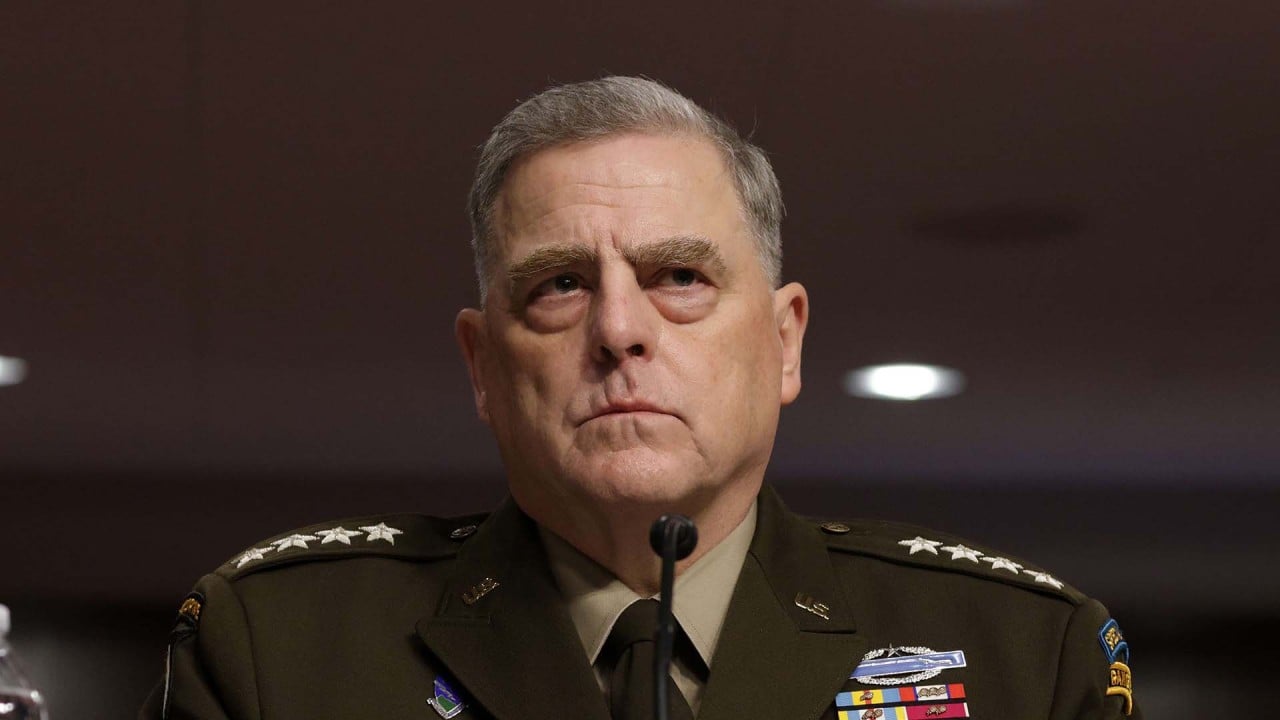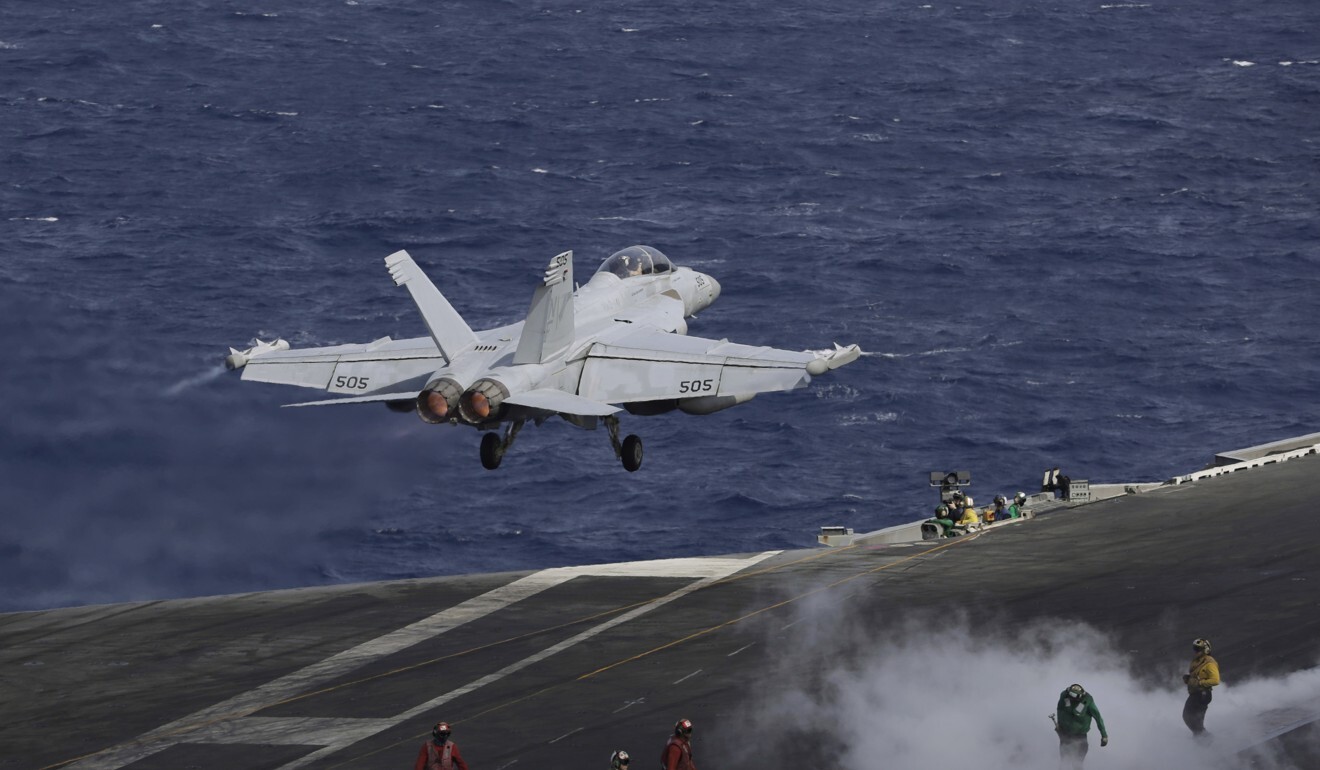
China feared US was trying to provoke a reaction ‘that could lead to war’ in last days of Donald Trump’s presidency
- Beijing became increasingly concerned that the White House’s stance on Taiwan was designed to push the PLA into taking retaliatory measures
- US General Mark Milley has previously outlined his efforts to calm Chinese fears by saying the US had no plans to mount a surprise attack
Milley made the first call on October 30 after intelligence showed that the People’s Liberation Army had raised its combat alert levels. He then made another call on January 8 to reassure the Chinese that the US would not make a “surprise attack”.
Taiwanese media then reported that the US ambassador to the United Nations, Kelly Craft, and secretary of state Mike Pompeo were also planning to visit the island, further stoking Beijing’s ire.

00:00
General Milley says calls to Chinese counterpart were to reassure Beijing that US would not attack
“That news came just a few weeks after Milley’s call, prompting Beijing to believe that the Trump administration was adopting ‘provocative tactics’ to push the PLA to take retaliatory measures that might trigger conflict, or even a war,” the source said.
“The PLA needed to know whether Studeman’s Taipei visit implied that there were different voices in the Pentagon supporting Trump’s possible plot. If the US insisted on doing that, then it would be war.”
The PLA immediately conveyed its concerns to US military attaches in their Chinese embassy in Beijing, Meanwhile, Li’s subordinates also tried non-military channels to express their views, which included sending a messenger to maintain contact with US consulate general in Hong Kong, according to the source.
“After a few weeks of engagements via several channels, Milley made the second call to Li [in January],” the source said.
US general defends calls to Chinese in Trump era as effort to avoid conflict
“Then Craft’s aircraft didn’t land on Taipei, while the US State Department also announced that Pompeo would not visit the island.”
Beijing regards Taiwan as a breakaway province and has not renounced the use of force to reunify it with the mainland.
Tensions between the two countries had been building up for months.
The US military made at least 17 sorties close to the southern Chinese coast with B-52 and B-1B strategic bombers in 2020, around a third more than in previous years, according to a report by Knowfar Institute for Strategic and Defence Studies, a think tank founded by retired Chinese military officers.

The incidents caused Chinese Defence Minister Wei Fenghe to make a call to his US counterpart Mark Esper on August 8 to say both sides should work to avoid conflict.
PLA troops in the South China Sea were also told by Beijing “not to fire the first shot in a stand-off with US forces soon after Wei and Esper’s phone call,” according to another source, who requested anonymity due to the sensitivity of the topic.
In the final stages of the US presidential election, speculation grew that Trump might try to increase his chances with an “October surprise” and attack China, according to the unclassified memo provided by Milley.
Chinese military sends record number of planes to test Taiwan’s defences
“The US military’s increasing provocative moves in the South China Sea meant Beijing didn’t know how to react, especially since speculation about an ‘October surprise’ were spreading and cited by domestic and overseas media,” Zhou Chenming, a researcher from the Yuan Wang military science and technology institute in Beijing, said.
“What the PLA could do was push up operational readiness levels to deal with the increasing aircraft and warships sent by the US Indo-Pacific Command near China.”
On October 21 last year, foreign media reported that all the five PLA theatre commands were on “high alert” as a response to regional tensions, pushing Esper and other interagency officials to direct Milley to contact his counterpart, according to the memo.

06:24
Explained: the history of China’s territorial disputes
Zhou said the intensive engagements between the two militaries in the last two months of Trump’s presidency had helped to build trust.
Tian Shichen, director of the Centre for the International Law of Military Operations in Beijing, said: “The phone calls did help both sides to enhance crisis control of front-line troops, whose military professionalism might be affected by hostility amid the two great powers’ fierce competitions.”
However, the situation worsened after Trump’s election defeat when Esper, whom the PLA saw as a reliable and professional American counterpart, was sacked by Trump on November 9, which was followed by resignations of several senior military officers in the Pentagon.
Beijing launches drills aimed at Taiwan as US warship transits strait
“The PLA needed to deal with five US defence chiefs in Trump’s four-year-long presidency, you can imagine how frustrated they were,” Zhou said, referring to James Mattis, Esper and three acting chiefs in the Pentagon.
Two days later, Milley called Li again. “I am certain that President Trump did not intend to attack the Chinese, and it is my direct responsibility … to convey that intent to the Chinese,” Milley told the committee on Tuesday, defending himself from accusations of disloyalty made by Trump and some Republicans.
“My message again was consistent. Stay calm, steady and de-escalate.”
On January 30, US intelligence reports confirmed that the PLA were reducing operational readiness levels in the region, according to the memo.
Drew Thompson, a former US Defence Department official who managed relations with mainland China, Taiwan and Mongolia, said the document had proved Milley was just doing his job.
“It’s clear from the memo he followed protocols and coordinated with the interagency, so there should be no question that he was fully within his authority,” he said.

